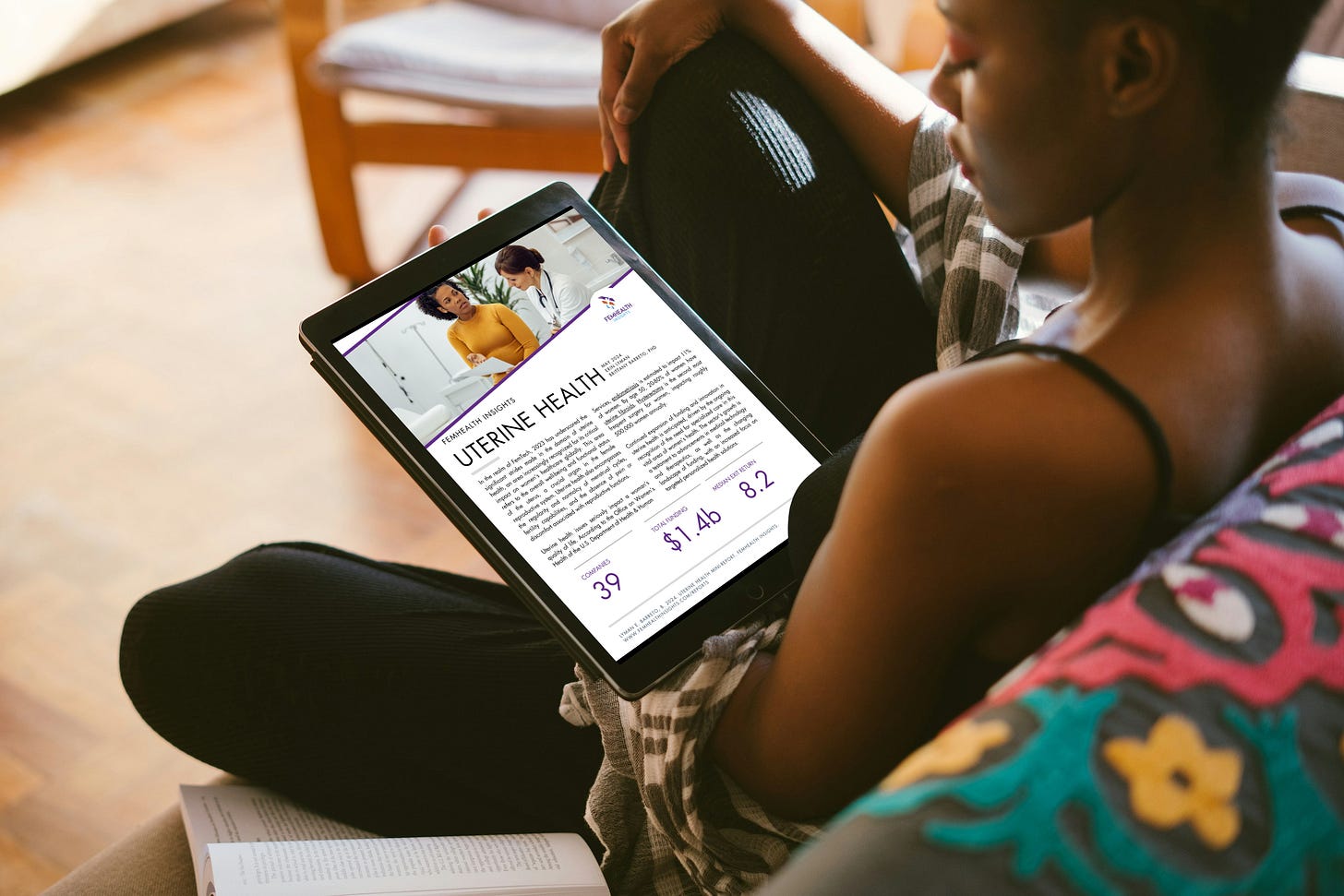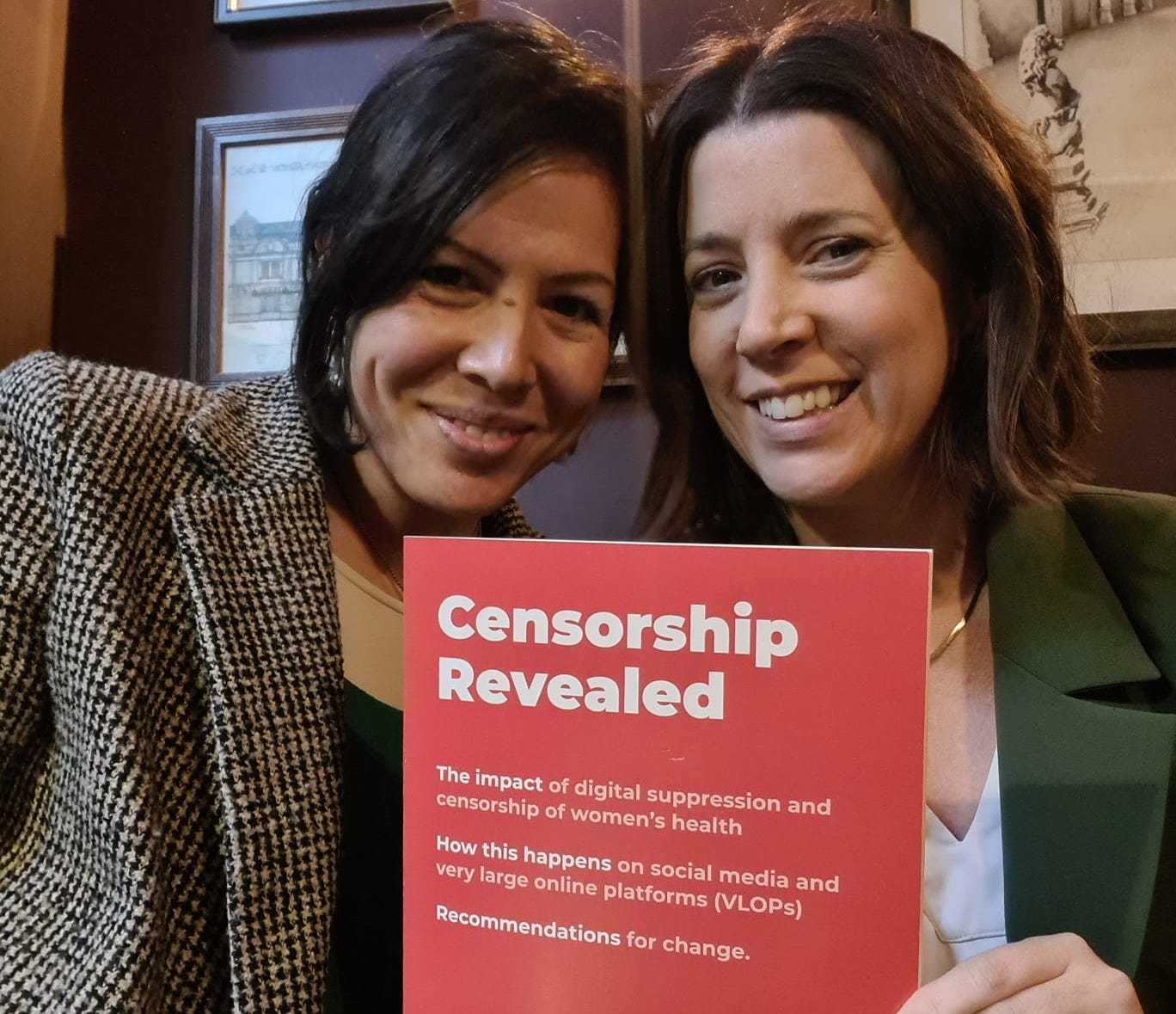💌 Issue #124: Asking better questions | $27m for Perelel | Millie's maternity AI solution... while U.S gets 'D+' in preterm birth rates | Big tech and women's health
The global weekly briefing on women's health innovation and FemTech
Welcome to FutureFemHealth, (w/c Nov 24 2025) — the global weekly briefing on women’s health innovation, trusted by 8,800 investors, innovators and leaders to decode the funding flows, breakthrough ideas and policy shifts transforming the sector.
After last week’s Parliamentary roundtable in London for CensHERship (an update on that under the policy section below!), I’ve been in Copenhagen this week for a ecosystem meet-up with the Women’s Health Horizons team and the Nordic Women’s Health Hub. The event was at capacity with a wait-list - an excellent indicator of the strength of the community here in Denmark.
🌟 In this week’s briefing:
🏆 Women’s vitamin brand Perelel raises $27 million
🤰🏼 Millie introduces AI solution for maternity care
❌ U.S gets a ‘D+’ in preterm birth rates and maternal equity
🛑 Big tech’s sexism is jeopardising women’s health
Got news to share from the world of FemTech and women’s health innovation? Let me know at anna@futurefemhealth.com
Building better questions to close the gender data gap
The gender data gap shows up everywhere in women’s health, but it’s at its most acute in communities whose stories have been historically sidelined or misinterpreted.
Danika Kelly has seen that up close through her work as CEO and co-founder of My Normative, a Canadian women’s health research platform on a mission to close the gender data gap.
She’s seen how conventional research methods fail the very people they’re meant to understand. In conversations with Indigenous women for example, she’s heard how pregnancy and postpartum stories can end up being misunderstood or mishandled.
“Pregnancy and postpartum stories are incredibly vulnerable”, she told me. “If we’re asking communities to trust us, we have to build processes that respect how they understand time, health, risk and experience.”
Take the simple example of asking ‘how far along are you?’ - which seems a routine question. But in some Indigenous communities, pregnancy is understood through moon cycles rather than weeks or months.
“If you don’t understand that potential time differential, you misinterpret what someone is telling you — and you risk treating their story as unreliable,” Danika explains.
This awareness is the starting point for a new collaboration that My Normative announced this week with Enoch Cree Nation Sovereign Health and Health Cities, focused on gestational diabetes which disproportionately affects Indigenous women.
The project doesn’t start with data collection though - it goes back to basics co-developing a shared ‘data dictionary’ so that there’s a shared language for how data is collected. It will be grounded in the principles of OCAP - ownership, control, access and possession.
This latest My Normative project has real parallels to broader issues in women’s health - big questions such as who controls data, who owns it, who benefits from it. And, as Danika explains, the opportunity right now is for agreed principles and shared rules - ‘setting up the playing field’ if you will.
“There are thousands of lifetimes of work to be done,” says Danika.
“Everyone is moving fast, but everyone is moving differently. If we can create a shared understanding of how to work — not competitively, but constructively — everything else becomes easier.”
Continue reading our full interview with My Normative’s Danika Kelly.
📦 Introducing the FemTech Files - a ten-part series
I’m excited to share with you free access to a ten-part series of FemTech reports, straight from the archives of FemHealth Insights.
‘The FemTech Files’ shares the critical data from different women’s health verticals and product types. They were published last year using Dr Brittany Barreto’s FemHealth Insights database and created by FemHealth Fellows.
Now, before the data gets outdated, Dr Brittany Barreto wants to share the reports for free to the community.
The first three reports are now available:
Coming up over the next few weeks there will be reports on menstrual health, mental health, menopause and more.
💰 Capital flows: where are investors placing bets?
📌 U.S: Women’s vitamin brand Perelel raises $27 million. Originally launched five years ago as a supplement brand selling fertility vitamins, Perelel has expanded into green powder and protein since. With the new capital, Perelel aims to increase brand awareness and reach more customers. This round was led by Prelude Growth Partners. (Continue reading: Fortune)
📌 U.S: $4m donation will create women’s health and menopause initiative at Massachusetts-based University. Investor and philanthropist Linda Moslow said that hearing from Medical School graduates that they were not educated on women’s health issues at Tufts University because it was not part of the curriculum was “eye-opening”. That insight inspired Linda and her husband Jeffrey Moslow to make this donation to fund new professorships and create educational opportunities for students, faculty and external professionals. (Continue reading: The Tufts Daily)
🌟 Industry moves and strategic shifts
📌 U.S: Millie introduces AI solution for maternity care. ‘Maia’ is an AI tool that answers routine questions about maternity care, helps with appointments and provides reminders. This integrates with Millie’s patient-facing app. Importantly, if it identifies issues with the patient it will escalate it so that Millie clinicians can provide timely care. (Continue reading: MedCity News)
📌 U.S: WellTheory integrates Instacart grocery stipends into autoimmune care. This new partnership will allow approximately 300,000 eligible individuals in WellTheory’s network to receive a stipend to purchase clinically recommended foods from their local grocers through Instacart. “We’ve learned that the real power in autoimmune care comes from small, consistent daily actions – but only if people can actually take those actions,” Claire Rudolph, cofounder and head of product at WellTheory. (Continue reading: MobiHealth News)
📌 U.S: Amara Therapeutics launches Dry Days Health, a virtual clinic for women with urinary incontinence. An estimated 78 million women in the U.S alone suffer from urinary incontinence but fewer than half of those affected ever reach a specialist. Stigma, cost, a shortage of specialists are all contributing factors. Dry Days Health will offer next-day virtual appointments and provide personalised treatment plans remotely. A 2026 expansion is planned following this initial launch in Indiana and Maryland. (Continue reading: FutureFemHealth)
📌 U.S: Evvy expands menopause care with new estradiol vaginal cream. Evvy’s data shows up to 84% of women experience vaginal and urinary symptoms during menopause, yet treatment options address moisture without considering microbial health. This new Evvy formula aims ot offer a more complete approach, avoiding irritants such as parabens and sulfates. “Vaginal estrogen is one of the most effective and underused tools for restoring comfort after menopause,” says Dr. Kate McLean, OB-GYN and Chief Medical Officer at Evvy. (Continue reading: WellWorthy)
📌 GLOBAL: How Femtech is filling the healthcare gap. There’s clear evidence that women are proactively managing their own care when the healthcare system falls short. In this new piece from Clue’s CEO Rhiannon White, she argues that we need to stop treating women’s health as an optional add-on and start centering it in healthcare so that women aren’t left footing the bill. “Whoever bridges the gap between healthcare and self-care will drive the next evolution in femtech and women’s health.” (Continue reading: Forbes)
🩸 Research and women’s health news
📌 U.S: March of Dimes report gives U.S a ‘D+’ in preterm birth rates and maternal equity. The U.S maternal and infant health crisis continues with preterm births stagnant at 10.4% (or 380,000 in 2024) - the same figure as 2023 and 2022. While 19 states did see rates improve, another 21 saw them worsen. And rates by maternal race/ethnicity were steeper for Black mothers (14.7%) than for Asian or White mothers. The annual March of Dimes report again highlights the importance of adequate and appropriate prenatal care as it allows for issues to be identified earlier. (Continue reading: TechTarget)
This week’s poll
Last week’s poll asked: Do you plan to attend an in-person health event in 2026? 82% of you are definitely or probably going to attend at least one in-person event next year. Just 9% of you said ‘no’ to this, with the rest undecided.
📄 Policy watch: risks and opportunities
📌 UK: Big tech’s sexism is jeopardising women’s health. Shadow banning of women’s health is not a technical glitch. It is a clear systemic failure. And it is time for the government to make those responsible answer for it. Emily Darlington MP debriefs on last week’s Parliamentary roundtable (which I attended as part of CensHERship) and explains why we need better transparency, better reporting mechanism and proper accountability. (Continue reading: Politics Home)
📆 Save the date
📌 Celebrate innovation in FemTech, London, 5pm, Dec 10 2025
Organised by the High Commission of Canada in the UK, this evening in London will celebrate the Canada-UK collaboration in Women’s Health and welcome to London the visit of nine pioneering Canadian FemTech companies and key stakeholders shaping the future of women’s health and technology. All welcome at Canada House in London for this networking event - just remember to RSVP below and bring a government-issued photo ID on the day.
🎟️ RSVP here to the event or email ldn.rsvp.ced@international.gc.ca
That’s all for this week! If you’ve missed any previous newsletter issues catch them all at futurefemhealth.com and do make sure to follow us on LinkedIn.
Anna
PS. FutureFemHealth reaches 8,800 decision-makers and professionals in women’s health each week - from investors and founders to healthcare leaders and corporates. To explore partnership opportunities or request our media pack contact: anna@futurefemhealth.com







